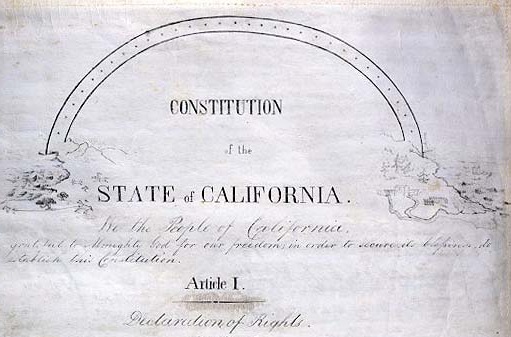
California Constitution. (Photo: www.sos.ca.gov)
California Commission on the Governorship
The Supreme Court has exclusive standing to raise questions of vacancy or temporary disability
By Chris Micheli, January 1, 2022 3:11 pm
Have you heard of the Commission on the Governorship? In the California Constitution, Section 10, there are provisions related to what happens when a vacancy occurs in the office of the Governor. This includes the “order of precedence” for succession to the office of the Governor. Additionally, Section 10 specifies that:
- The Supreme Court has exclusive jurisdiction to determine all questions arising under this section; and
- Standing to raise questions of vacancy or temporary disability is vested exclusively in a body provided by statute.
We turn, then, to Government Code Title 2 (Government of the State of California), Division 3 (Executive Department), Part 2 (Constitutional Officers), Chapter 1 (Governor), Article 7 (Commission on the Governorship). Article 7, which contains Sections 12070 – 12076, was added in 1966.
Government Code Section 12070 provides that there is in state government a Commission on the Governorship, which consists of the President pro Tempore of the Senate, the Speaker of the Assembly, the President of the University of California, the Chancellor of the California State Colleges, and the Director of Finance. Section 12071 grants the Commission exclusive authority to petition the Supreme Court to determine any questions that arise relating to vacancies in and succession to the office of Governor.
Section 12073 similarly grants the Commission exclusive authority to petition the Supreme Court to decide any questions relating to the termination of the temporary disability of the Governor. Section 12074 provides that the President pro Tempore of the Senate is the chair of the Commission and the Speaker of the Assembly is the vice chair. In addition, the Commission is required to meet at the times and places designated by the chair, and, in the chair’s absence, the times and places designated by the vice chair.
Section 12075 provides that the Commission may file a petition to the Supreme Court only if a majority of the members of the Commission vote to take such action. Section 12076 specifies that the Commission has the power of a head of a department to make investigations to determine whether or not a petition should be filed. And, every state agency is required, on request of the Commission, make available to the Commission the facilities and personnel of the agency to enable the Commission to perform its functions.
- Frequently Asked Questions on California Legislature Conducting Its Work - April 20, 2024
- What Information Has to Be on the LegInfo Website? - April 19, 2024
- New Assembly Bill Would Ban NDAs in Legislative Negotiations - April 19, 2024




